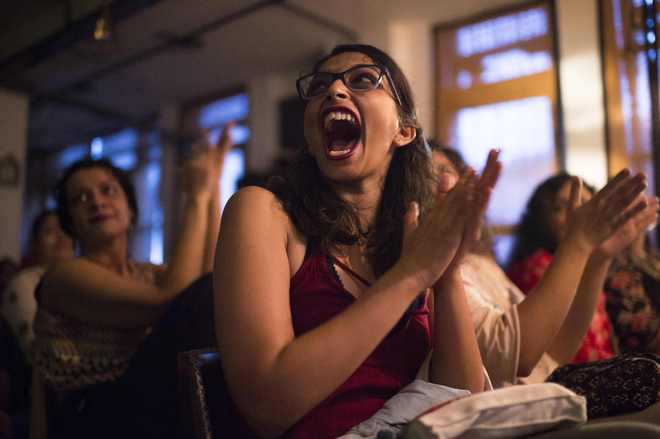Women, laugh out loud!
Men are strictly banned at Femapalooza, a comedy show for Indian women where the punch-lines range from breasts and bras to equal pay and censorship. They are not allowed to attend, perform, or even check tickets at the most recent show at a New Delhi club.
For Femapalooza founder, Jeeya Sethi, humour just for women is a way to make progress in deeply patriarchal India, where rape and gender bias are hot-button issues and women are widely expected to adhere to conservative stereotypes. “Men only talk about men or they make sexist jokes,” says Sethi, a stand-up comic herself.
Femapalooza has organised more than 35 shows in different cities over the past three years, providing what Sethi calls a safe and friendly environment for women comics.
“Stand-up is all about being unabashed. When there are women around you can say anything at all and not be judged,” she adds. Rights activists have campaigned for years for greater access to public and performing spaces for women in India - and their safety, given the record of violence against women in the country.
Some have emerged in recent years, with similar comedy events held in Mumbai and Bengaluru. Women-only shows such as “Leddis Night” by online magazine Ladies Finger and “Disgust Me” by stand-up comedian Sumukhi Suresh have been widely acclaimed.
Great show
At Femapalooza’s New Delhi show, 13 comedians, aged between 17 and 37, tried out their jokes on an audience of as many as 30 women in an intimate, dimly lit room. Some appeared nervous, but the crowd revelled in every woman-friendly gag.
Priya Elias vented her frustration with thongs. “Women don’t enjoy wearing thongs... I am pretty sure a man invented them... The energy in the room is different. Women are always told they are not funny and that is not true at all,” says the former lawyer. First-time performer Naomi Barton says she is more comfortable sharing her jokes with a women-only crowd, with no pressure to please men. “When I talk about PMS (premenstrual syndrome) and how it affects my mental health, landing me in funny situations, a woman will get it,” says Barton, a digital publisher with a major firm.
Aditi Mittal, one of the few women to have made an impression in India’s male-dominated comedy scene, has a special affection for women-only shows. “Many men think women are doing stand-up comedy because they are so desperate for attention,” quips Mittal, the first Indian woman to get her own special on Netflix.
Big platform
Platforms such as Femapalooza have helped bring more women on to the comedy circuit, but there have been objections about its format. Male comics have complained about the women-only events, even calling them sexist, Sethi shares.
In response, her company, Comedy Ladder, organised an event where both men and women performed. The show introduced men as male comics on stage and women simply as comics. Femapalooza’s audience has grown as word has spread. It does not always get a five-star rating, however.
“It was a novel concept, but only a few interesting performances... there were many first-timers,” says Deepshikha Singh, a communications professional in the New Delhi audience. —AFP









